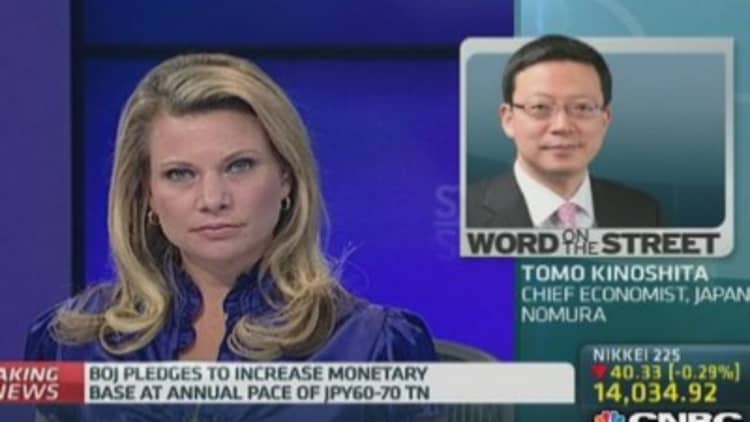
The Bank of Japan (BOJ) kept monetary policy steady by a unanimous vote on Wednesday, but revised up its forecast on expenditure – a traditionally weak indicator – a move that's viewed positively by analysts.
As expected, the central bank maintained its pledge to increase the monetary base at an annual pace of 60-70 trillion yen and kept its overall assessment that the world's third-biggest economy continues to recover moderately.
The yen weakened slightly to 101.37 against the U.S. dollar on the news.
Read MoreIs a massive rebound coming for the Nikkei?
"Our quantitative-easing policy is exerting its intended effects," BOJ governor Haruhiko Kuroda told a news conference after the decision on Wednesday. "The Bank of Japan will continue with this policy until the 2 percent target is achieved in a sustained manner."
Analysts say the BOJ is showing growing confidence in its outlook for the country, despite concerns the hike in the sales tax that took effect in April will hamper growth.
"We see good news after the last BOJ meeting. The decline in demand after the consumption tax hike was moderate, and there was a surge in private investment in the first quarter. So we believe that the BOJ has become slightly more confident, though it's not enough to change their economic assessment," said Tomo Kinoshita, chief economist of Japan at Nomura.
Japan's economy grew at an annualized pace of 5.9 percent in the first quarter, data released last week showed, posting its fastest growth in almost three years.
Read MoreJapan's exports pick up steam in April
While most analysts aren't expecting the bank to ease monetary policy imminently, many still see a move before the year is up.
"The BOJ will definitely see the impact of the sales tax rise before they would act further, so July is probably the first BOJ meeting we could consider [a move to happen], because they'll have one quarter to assess how the sales tax was affecting the economy. If they don't move in July then October makes a lot of sense because that's when they update forecasts," said Mansoor Mohi-Uddin, chief currency strategist at UBS Investment Bank.
According to Nomura's Kinoshita, consumer prices remain front and center for the BOJ, as it presses on to meet its 2 percent inflation target in a year's time. Core consumer prices in Tokyo, a leading indicator of nationwide inflation, rose to a 22-year high in April.
Read MoreThe last guy you'dexpect to not understand Japan
"We believe that the core CPI inflation stay around the current level for April,May and June, and it will start to drop little by little from July. We think that BOJ is very likely to act in October meeting," Kinoshita said.

